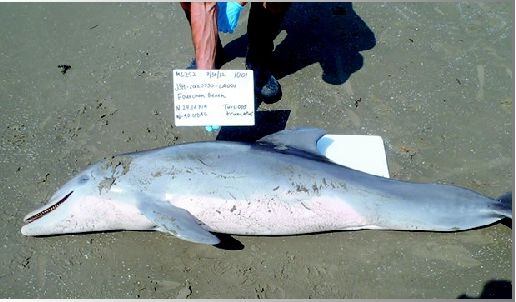
Greg LeBlanc
May 27, 2015
Q&A – Keierica Howard
May 28, 2015A peer-reviewed study by NOAA scientists offers the first conclusive determination that record die-offs of dolphins in the Gulf of Mexico are related to the 2010 Deepwater Horizon oil spill.
BP, the company that legally responsible for the spill, questions the findings, suggesting that they are best circumstantial. Company officials note that no physical evidence exists showing a connection between dolphin deaths and oil released by the ill-fated Macondo well.
The April 20, 2010, Deepwater Horizon explosion 60 miles off the Louisiana coast killed 11 workers. Crude oil from the related spill gushed uncapped for five months thereafter, closing down fisheries throughout the northern Gulf of Mexico, impacting thousands of jobs and affecting the health of workers hired to clean up the spill.
Hints of major effects on marine mammals have drawn attention in past years, but none with the specificity of this newest study, released in the scientific journal PLOS ONE.
“This is the latest in a series of peer-reviewed scientific studies, conducted over the five years since the spill, looking at possible reasons for the historically high number of dolphin deaths that have occurred within the footprint of the Deepwater Horizon spill,” said Dr. Teri Rowles, a veterinarian who is one of the paper’s 22 contributing authors. Rowles is the chief of NOAA’s Marine Mammal Health and Stranding Response Program. “These studies have increasingly pointed to the presence of petroleum hydrocarbons as being the most significant cause of the illnesses and deaths plaguing the Gulf’s dolphin population. This study carries those findings significantly forward.”
The study’s abstract states that 2010 and 2011 had “the highest annual number of stranded dolphins since Louisiana’s record began, and 2011 was one of the years with the highest strandings for both Mississippi and Alabama.”
Causes of death during the period studied have been related to thinned and shrunken adrenal cortexes and occurrences of bacterial pneumonia.
During a teleconference last week, NOAA scientists said that while both conditions occur in dolphin species, they have not been seen in the concentrations of events in the dolphin that were studied. Both live and dead dolphins were included; control groups of dolphins for study were from unaffected waters in the eastern Gulf and the south Atlantic.
Researchers record data and photograph a dead dolphin that stranded along the Port Fourchon Louisiana coastline in July 2012 following the 2010 Deepwater Horizon oil spill.






